Colleges and universities across the state are continually tweaking their longstanding models to ensure they are offering programs that make sense for the current times.
Such was the impetus for the new master’s degree in professional studies introduced this month by The College of New Jersey.
The school, seeking to find a way to creatively connect its certificate programs in manners that work for an individual’s goals, has created a program in which students can combine two certificate programs (four to five classes for each) with two required courses to create a unique master’s degree.
Suzanne McCotter, dean of graduate and continuing education at TCNJ, calls it a flexible master’s program.
The program allows for flexibility in disciplines, delivery and duration, and allows students to earn a master’s degree aligned with their specific professional aspirations across two connected fields of study.
“This personalized degree will allow students to create their own path toward professional growth by stacking together two certificates,” McCotter said. “We are excited that both prospective students and their employers will be able to create a sequence of educational experiences that can be of such great value.”
Students can complete the program on a part-time basis. Many of the classes will be virtual, although some will be hybrid.
To earn the degree, grad students will select two certificate programs from a diverse set of nine the school offers (everything from business analytics to gender studies to public health to public policy). The certificate courses will be either four or five classes.
They also will take two mandatory classes (one at the beginning; one at the end), giving them a total of at least 10 classes, but no more than 12.
The idea, McCotter said, is to create programs specifically to match the passions or professional experience of an individual.
“If you have a passion for public health and professional writing, we want to help you get an advanced degree in those fields,” she said. “It’s really whatever makes sense for the student and their professional goals.”
Here’s a Q&A explainer of how it works:
ROI-NJ: Grad students can choose two of nine certificates. What are the nine options?
The College of New Jersey: They can select from:
- Business analytics;
- Diversity, equity, inclusion & antiracism;
- Gender and sexuality studies;
- Health and risk communication;
- Professional and user experience/user interface writing;
- Public health;
- Public policy;
- Strategy, innovation and leadership;
- Wellness coaching.
ROI: What are the two mandatory classes?
TCNJ: They are:
- Creativity and Community: A Design-Thinking Approach. The goal is to find potential ways their two certificates will work together;
- Master’s in Professional Studies Capstone Class: The goal is to weave together what they learned.
ROI: Can classes I took at the undergraduate level count toward my master’s?
TCNJ: Only if they were graduate-level classes.
ROI: Can classes I took at a different university be used?
TCNJ: Up to three classes can transfer, pending approval.
ROI: Is there any other way to get credits before you start?
TCNJ: A student potentially could get credit for an introductory class based on work experience.
ROI: If I previously earned a certificate at TCNJ, can I use that for the program?
TCNJ: Yes. It would only mean the introductory mandatory course would come between certificates, as opposed to before the program begins.
ROI: How would a graduate describe the degree on their résumé or LinkedIn account?
TCNJ: Call it a master’s in professional studies with an emphasis on the two certificates. It’s the same way you might say you have a degree from the business school with an emphasis on accounting or finance.
ROI: Is TCNJ the first school to offer such a program?
TCNJ: We are in New Jersey, but not in the country.
